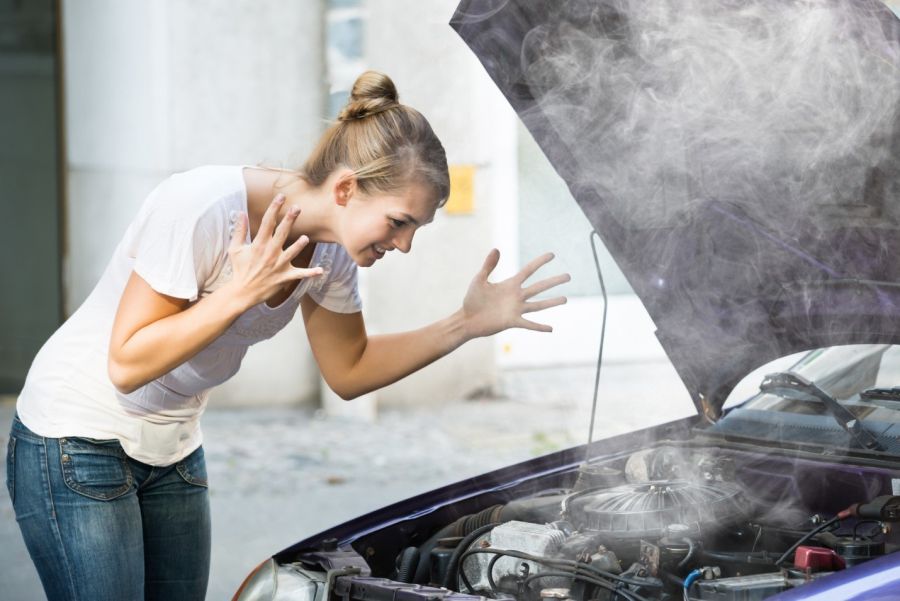The car purchasing process is supposed to be an exciting process. After years of wearing down “ole reliable”, you finally get to upgrade to a new (or used) car.
However, there are nightmare scenarios in which a person buys a used car, then has something go wrong and it breaks down. Those situations will certainly have you singing the blues!
While rare, those situations happen and can be detrimental to the person that just purchased the car. In fact, many people don’t know what to do if that were to happen.
So if you’re saying “I bought a used car from a private seller and it broke down”, then this is what you can do!
Bring it to the Private Seller’s Attention
Unfortunately, if you purchased your car from a private seller, then it’s likely you didn’t buy your car with a warranty on it.
If that’s the case, then you don’t have much pull on your side of this. Technically, the private owner has no responsibility to it once you’ve signed the dotted line.
However, many private owners will feel bad for your troubles and might help you out in order to help you compensate.
If they sell a lot of cars, then they might be afraid this incident will give them a bad rep.
Don’t be afraid to speak up and don’t wait. One of the first things that you should do is notify your private seller of what happened and see if they’ll compensate you financially or help lower your labor charges to get it fixed.
If all else fails, the seller may be willing to take the vehicle back and return your money. If it was a long distance sale, you could arrange with an auto transport company to send the car back. They may even be able to split the cost so ship.
Used-Car Lemon Laws
For those of you that are unfamiliar with the term, a “lemon” is a term for a car that is constantly in and out of the shop due to its many problems. Odds are that you’ve had more than one “lemon” in your driving career.
Fortunately, some states (such as New York, New Mexico, Minnesota, and Connecticut) have installed used-car lemon laws to protect used car buyers from dealing with a lemon that they just purchased recently
The law insists that every used-car purchase has some type of warranty, whether contracted or otherwise.
The big indicator of this warranty is how much mileage is on the car at the time of the purchase.
In those situations, the private seller must repair any issues within a certain mileage range (the warranty duration).
If the problems continue even after multiple tries, then that private seller has to either refund the money or replace the car, whichever you two agree on.
There are other states, such as Pennsylvania, Illinois, Arizona, Nevada, Maine, and North Carolina, that protect a used-car buyer from what they consider “unfair” selling practices.
Be sure to check and see what your state’s laws are and how they can help your situation.
If You Haven’t Bought Yet, Then Have It Inspected!
One of the best ways to avoid this entire situation is to have the used car you’re interested in buying thoroughly inspected by a third-party. If you have a trusted car mechanic, then be sure to have them take a look at your potential vehicle.
Many people opt not to take advantage of this because they’re afraid it will harshen the relationship between you and the seller.
Simply put: if the private seller gets upset about your wanting to inspect it, it’s because they have something that they’re hiding. They know something that you don’t and want to keep it that way.
The inspection itself shouldn’t take very long, and you can actually arrange the inspection to be done during your test drive.
This will protect you and your family from running into a situation where your finances are compromised.
Even if you’re confident in the legitimacy of the private seller, still have it looked at. There might be an upcoming issue with the car that they weren’t even aware of. Do your due diligence… you won’t be sorry.
Check the Car’s History Report
Gone are the days of taking a previous owner’s word for the integrity of a car that you’re interested in buying.
These days, every single car has a history report, and those history reports are available via the internet. If you can’t find the history report of a vehicle, then run for the hills!
Car history reports help provide accountability to the car sales process. They’ve become so mainstream in order to avoid situations such as the ones listed above.
You will be able to tell if a car falls under the category of “lemon” if it’s had too many visits to the auto shop to count.
If the private seller you’re buying from doesn’t have a history report, then ask them for the vehicle’s VIN number and check for yourself.
These can still be a bit askew, so don’t take them as absolute. For example, don’t automatically assume a car history report with minimal repair visits means the car is trustworthy.
For all that you know the previous owner has been “fixing” the problem themselves for all these years. Be sure to use your best judgment.
I Bought a Used Car from a Private Seller and It Broke Down… Now What?
There you have it! You now know the answer for those of you saying “I bought a used car from a private seller and it broke down”.
To avoid this headache, be sure to do your due diligence from the get-go and set yourself up for success.
Be sure to visit our website for more articles on cars, as well as many other helpful topics.

